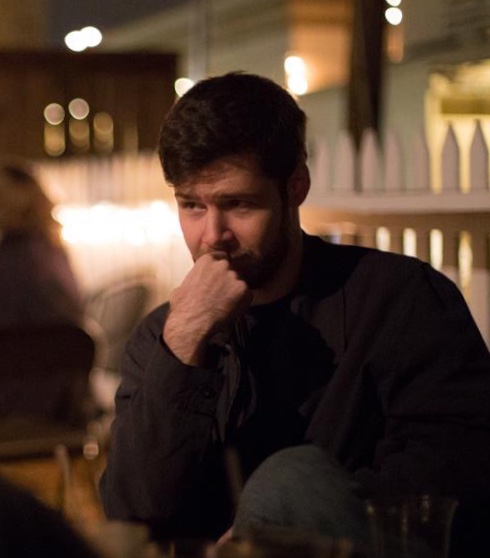ISSN: 1941-4137
POETRY THAT ENACTS THE ARTISTIC AND CREATIVE PURITY OF GLASS
POETRY THAT ENACTS THE ARTISTIC AND CREATIVE PURITY OF GLASS

R.M. Haines is a writer and teacher from southwestern Ohio. He is a graduate of Kenyon College and the University of California Irvine and received a doctorate from the University of North Texas. His poems appear or are forthcoming in Kenyon Review Online, Pleiades, Poets.org, Poetry Northwest, Salamander, and Spoon River Poetry Review. In addition, his reviews and interviews appear or are forthcoming in American Literary Review, Denver Quarterly, Image, Poetry Northwest, and Tupelo Quarterly. He lives in Indiana.
Also by R.M. Haines:
Medusae (II)
The Instructor
Rilke's Sappho
after New Poems (1907)
Our souls live on betrayal.
— "Eastern Aubade"
i.
In the mall, music comes from everywhere. It says I am in love. I am a boy surrounded by books on other vampires, on their hunger. Here, I see you being seen. I see me. In the fountain, beneath the skylight, the chlorinated water preserves each coin's dead voice: "Give me what I want. Give my want to me." Where does it all come from? Why would that girl wade into the water up to her knees, being stupid, daring the strange cops? It's that song again. In my mind, the fountain's plastic pipes branch down under the neon tile, their lattice of veins sutured to the source with a timer. The reservoir. The elsewhere. There.
ii. Sappho to Eranna
Like ruin
I want to blur in you —
to flaunt you,
adorned with ink and weeds.
That's my ghost,
crazing across your face,
studying you
like police.
These,
my plastic arms,
gone right through you
like dying does,
to turn your splayed nerves over
to all of it,
to the sprawl we are,
to all the hiding
and doubling
things.
iii.
In her blood, something wakes to itself, blind and molting. Each syllable's hiss turns to a hum inside her. She hums it. Who is she now? Her name was stolen away: she is She Who Cannot Hide. And she can't. She's there. With her radio, the singer beside her stares, studying how this one's soul is a naked ear. Each millisecond, the song blurs and grafts new neurons between their arms, their hair. The song is silt. Pollen. Polyethylene. Now Eranna is almost lost. She'd go missing forever for the singer who stares. Gone. Into the song.
iv.
Living on betrayal, our souls
scatter everywhere. All ears,
they fray in dark filaments,
tangling in weeds, grafted
to each stranger's voice. Tonight,
a whisper from nowhere
wears my listening like a mask
saying, Flower-muscle, fountain-
mouth, tall tree in the ear, no,
a soul won’t keep. Called to,
it wakes, it flies. So here,
little warden, little maniac,
take this. Let it not be anything —
let my song mistake your face.
v.
Just after "The Song of the Women to the Poet," in "The Poet's Death," the poet is propped in bed. He is a boy again, sick of his room, bored with love. His eye seeks the rippling window glass and, past it, earth and limestone, grasses beside the sterile, trembling waters. Listen. He is no longer there. What that song had been is now this unlaced shoe. That bottle of pills. A fig. One distracted, little fly. We hearers, death lets us take this in. Then we flip the page, and the next song begins to hide.
"Rilke's Sappho" is in dialogue with Rilke's work in general, but especially the first eighteen poems in his New Poems (1907). These stand apart from the rest of that book and are unified by their concern with intimacy, listening, and song. "Song," for Rilke, is poetry, and yet it is also a state of consciousness in which the aesthetic, erotic, and spiritual converge. The crux of the New Poems of 1907, however, is that eros, while essential, is also capable of betraying this state of song and turning it into domination, objectification, and vain seduction. Reading them, I was specifically intrigued by the volume's poems about Sappho, in which she seduces and disorients her muse/lover, Eranna. There, I see Rilke (only half-consciously) confronting his own urge to dominate the other/listener/reader: as though song allows him a distance in which he can fake intimacy for egotistical ends — song as a shield, or perhaps as a weapon. Despite beginning in a mode of interrogation and critique (of Rilke, of myself, of lyric poetry at large), "Rilke's Sappho" turned into something much more forgiving and haunted, less convinced of any supposed morality of song and its authenticity. (Note: The 2nd and 5th sections of my poem are very loose adaptations of "Sappho to Eranna" and "The Poet's Death" from that 1907 volume. There are also phrases quoted from The Sonnets to Orpheus, and Edward Snow's translations were my guides in all these.)
Glass: A Journal of Poetry is published monthly by Glass Poetry Press.
All contents © the author.
All contents © the author.





